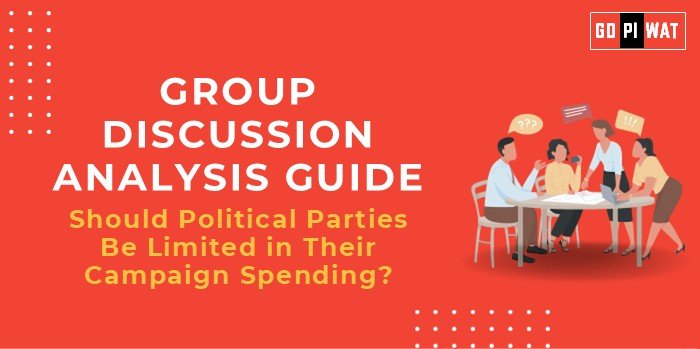📋 Group Discussion (GD) Analysis Guide: Should Political Parties Be Limited in Their Campaign Spending?
🌐 Introduction
Election campaigns often reflect the vibrancy of a democracy but raise questions about fairness and influence when spending spirals out of control. Implementing limits on campaign expenditures is a widely debated issue aimed at promoting equal opportunity and reducing undue influence in electoral processes.
📊 Quick Facts & Key Statistics
- 💰 Global Campaign Finance Spending: The 2024 US federal election cycle is projected to reach $15.9 billion, underscoring the escalating cost of political campaigns.
- 🇮🇳 India’s 2019 General Elections: An estimated expenditure of over ₹60,000 crore made it one of the most expensive elections worldwide.
- 🏢 Corporate Donations in India: The BJP received ₹719.858 crore in 2022–23, accounting for approximately 90% of corporate donations, indicating a significant funding concentration.
- 📉 Transparency Index (2022): India ranked 85th out of 180 countries in Transparency International’s Corruption Perceptions Index.
- ⚖️ Caps on Spending: Countries like the UK limit constituency spending to £30,000 in general elections, promoting equitable participation.
🧑🤝🧑 Stakeholders and Their Roles
- 🏛️ Election Commissions: Enforce spending caps and monitor violations.
- 🎭 Political Parties: Manage campaign resources and adapt to regulations.
- 👥 Citizens: Evaluate candidates without biases induced by extravagant campaigns.
- 🏢 Corporate Donors: Provide significant funding, sometimes influencing policy agendas.
- 📰 NGOs and Media: Advocate for reforms and ensure accountability.
🏆 Achievements and Challenges
🎉 Achievements:
- ⚖️ Spending Regulations: Caps in countries like the UK and Canada foster equity.
- 📋 Transparency Initiatives: Measures like India’s electoral bonds aim to trace funding.
- 🌐 Digital Campaigning: Social media reduces campaign costs, broadening outreach.
- 🌍 Global Best Practices: Germany’s public funding model ensures balanced resources.
⚠️ Challenges:
- 🔍 Enforcement Loopholes: Wealthy donors find ways to bypass regulations.
- 🏢 Funding Concentration: Corporate donations disproportionately favor dominant parties.
- 🕵️ Transparency Gaps: Opaque funding undermines trust in the system.
📚 Case Studies:
- 🇮🇳 India: Controversies over corporate donations highlight challenges in equity.
- 🇺🇸 US: Super PACs significantly influence election dynamics.
🌍 Global Comparisons:
- 🇪🇪 Estonia: Affordable digital campaigns set an example.
- 🇨🇦 Canada: Strict contribution limits promote fairness.
🗣️ Effective Discussion Approaches
📌 Opening Approaches:
- 💰 “With the 2024 US elections projected to cost $15.9 billion, do we need stricter regulations to curb excessive spending?”
- 🏢 “The BJP’s 90% share of corporate donations raises questions about equitable access in India’s democracy.”
🎭 Counter-Argument Handling:
- Acknowledge free speech concerns but emphasize solutions like digital transparency.
🔍 Strategic Analysis of Strengths & Weaknesses
- ✅ Strengths:
- Promotes fairness.
- Curbs corruption.
- Enhances democratic equity.
- ❌ Weaknesses:
- Potential underfunding for smaller parties.
- Enforcement gaps.
- 📈 Opportunities:
- Leverage digital tools.
- Implement public funding mechanisms.
- ⚠️ Threats:
- Resistance from major political players.
- Regulatory loopholes.
📖 Structured Arguments for Discussion
- ✅ Supporting Stance: “Limits ensure a level playing field and reduce undue corporate influence.”
- ❌ Opposing Stance: “Caps infringe on political expression and require careful calibration.”
- ⚖️ Balanced Perspective: “Spending limits are crucial but must be paired with robust enforcement.”
🎓 Connecting with B-School Applications
- 📘 Real-World Applications: Analyze campaign finance systems for governance or leadership projects.
- 📋 Sample Interview Questions:
- “How does campaign finance affect democratic integrity?”
- “What are the pros and cons of corporate funding in elections?”
- 💡 Insights for Students:
- Leadership challenges in resource management.
- Ethics in campaign funding as a governance case study.


